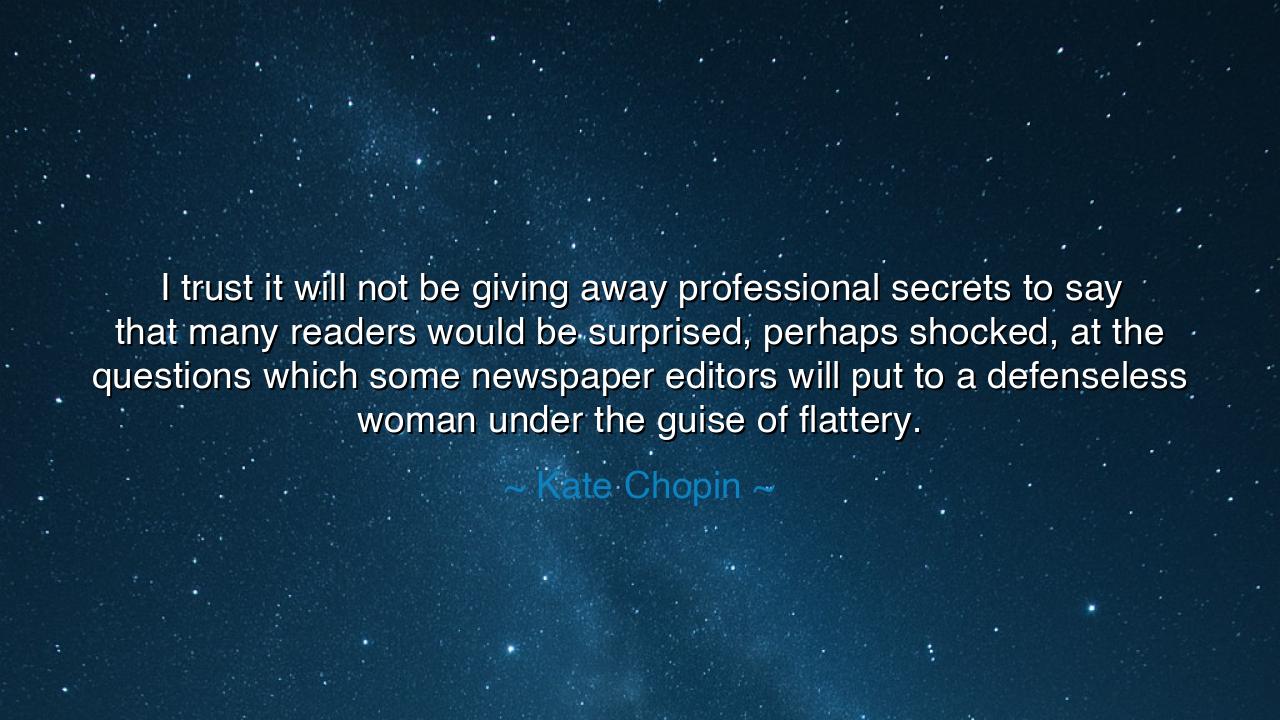
I trust it will not be giving away professional secrets to say
I trust it will not be giving away professional secrets to say that many readers would be surprised, perhaps shocked, at the questions which some newspaper editors will put to a defenseless woman under the guise of flattery.






Hear the voice of Kate Chopin, sharp and unafraid, unveiling a truth many in her age wished to conceal: “I trust it will not be giving away professional secrets to say that many readers would be surprised, perhaps shocked, at the questions which some newspaper editors will put to a defenseless woman under the guise of flattery.” These words pierce through the mask of politeness, exposing the hypocrisy of men who cloaked exploitation in charm. With the clarity of an ancient seer, Chopin reminds us that flattery, though it may sound like music, can often be the poisoned tongue of manipulation.
The meaning is layered with both pain and defiance. Chopin reveals how women, especially those stepping into the public sphere, were often cornered, their dignity tested by questions meant not to honor them, but to expose and diminish. The guise of flattery served as a shield for intrusion—soft words hiding hard intentions. Thus, her quote is not simply about journalism but about power: the abuse of authority to render another “defenseless,” all while pretending to honor them.
The origin of her words lies in Chopin’s own life as a writer in late 19th-century America, when women were still struggling to carve out a place in literature and in society. Her works, such as The Awakening, scandalized critics with their honest portrayal of female desire and independence. She knew firsthand the scrutiny of male editors and the double standards applied to women who dared to speak freely. Her statement is at once personal and universal—a cry against the unjust burdens placed upon women who dared to enter the realm of ideas.
History offers many mirrors to her lament. Consider Hypatia of Alexandria, a philosopher and mathematician in the ancient world. Revered by her students, she was nonetheless targeted by those who could not bear a woman speaking with authority. Beneath their accusations and slanders lay the same pattern Chopin described: the weaponization of words, flattery at times, but more often suspicion, to strip a woman of power. The assault on Hypatia’s dignity ended in tragedy, showing that words can wound as sharply as swords.
In another time, think of the suffragettes of the early 20th century. Journalists often mocked them, not with outright insults but with dismissive charm, treating their demands for voting rights as silly diversions. They, too, were asked questions designed not to uplift but to belittle, their courage dismissed under the cover of politeness. And yet, like Chopin, they refused to remain defenseless, choosing to turn words back upon their oppressors and to fight for dignity through persistence.
The lesson for us is vital. We must recognize that not all pleasant words are honest words, and that true respect is not wrapped in flattery but in integrity. We must be discerning when others speak to us, asking whether their words are meant to build or to undermine. And when we see others made “defenseless” by manipulation, we must stand with them, exposing hypocrisy for what it is.
Therefore, let Chopin’s voice echo into our lives: guard your dignity, do not be deceived by flattery, and do not allow yourself to be cornered under the guise of honor. Speak truth to power, even when it shocks, and defend those who have been silenced. For the measure of justice in any society is found not in how it flatters the strong, but in how it protects the defenseless. And only when truth is spoken boldly can the mask of hypocrisy be torn away, revealing the path toward genuine respect and freedom.






BNPhan Thi Bich Ngoc
This quote is a stark reminder of how media manipulation can happen under the guise of politeness or professional interest. It’s troubling to think that women, particularly defenseless or vulnerable ones, are often the target of these subtle forms of exploitation. How often do these situations occur behind closed doors in the name of ‘getting the story’? How can we cultivate a more respectful and ethical standard of journalism where personal boundaries are truly respected?
PHPhu Huynh
Chopin’s perspective seems almost prophetic, given how little has changed in the media’s treatment of women. The question is: why do editors or journalists continue to use such tactics? Is it a reflection of deeper societal issues, like sexism or the objectification of women? How do we address this ethical dilemma, where personal questions that invade privacy are disguised as professional, respectful inquiries? Should there be stricter boundaries in interviews?
QNQuach Quynh Nga
This quote makes me reflect on the darker side of media and the role of power dynamics. The idea that flattery could mask an intrusive or demeaning question is unsettling. Is it really possible to separate genuine curiosity from manipulation in an interview, especially when the person being interviewed is vulnerable? How do we, as a society, ensure that women’s voices are heard without subjecting them to harmful or exploitative treatment?
TLthu le
Kate Chopin’s quote highlights an uncomfortable truth about the way women have historically been treated by the media. It’s shocking to think that flattery can be used as a tool to manipulate and coerce. How often do we see this happening today, where women are subtly pressured to answer uncomfortable or personal questions under the guise of politeness? Should journalists be held accountable for crossing these boundaries, or is it just a part of the job?